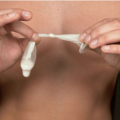Menopause is a natural biological process that marks the end of a woman’s reproductive years. It typically occurs between the ages of 45 and 55, with the average age being around 51. Menopause is characterized by the cessation of menstrual periods for a consecutive 12 months.
During menopause, a woman’s ovaries gradually produce fewer hormones, specifically estrogen and progesterone. This hormonal shift can result in various physical and emotional symptoms, including:
- Irregular periods: Menstrual cycles may become irregular, with periods occurring closer together or further apart.
- Hot flashes: Sudden feelings of intense heat, often accompanied by sweating and flushing of the face, neck, and chest.
- Night sweats: Hot flashes that occur during sleep, often causing excessive sweating and disrupting sleep patterns.
- Vaginal dryness: Reduced estrogen levels can lead to vaginal dryness, itching, and discomfort during sexual intercourse.
- Sleep disturbances: Many women experience difficulties with sleep, including insomnia or disrupted sleep patterns.
- Mood changes: Fluctuations in hormone levels can contribute to mood swings, irritability, anxiety, and even depression.
- Changes in sexual function: Some women may experience a decrease in libido or changes in sexual desire and response.
- Urinary symptoms: Menopause can increase the risk of urinary tract infections, frequent urination, or urinary incontinence.
The symptoms associated with menopause can vary greatly in intensity and duration among individuals. Some women may experience mild symptoms that don’t significantly disrupt their daily lives, while others may experience more severe symptoms that can have a significant impact on their overall well-being. The combination of physical and emotional changes can make menopause a challenging time for many women. In this article, we shall be looking at the impact of sperm and semen on menopausal symptoms.
Semen and its composition
Semen is the fluid that contains sperm as well as other components. The composition of semen can vary slightly among individuals, but it generally consists of the following components:
- Sperm: Sperm cells make up a relatively small portion of semen. They are produced in the testes and are responsible for fertilizing an egg during sexual reproduction.
- Seminal fluid: The majority of semen is made up of seminal fluid, which is produced by various accessory glands in the male reproductive system. These include the seminal vesicles, prostate gland, and bulbourethral glands. Seminal fluid provides nourishment, protection, and transportation for sperm. It contains a variety of substances, including:
- Fructose: Seminal fluid contains fructose, a sugar that serves as an energy source for sperm.
- Enzymes: Enzymes in the seminal fluid help to break down the outer layer of the egg during fertilization.
- Prostaglandins: These hormone-like substances help to regulate inflammation and smooth muscle contractions, assisting with sperm motility.
- Buffers: Seminal fluid contains buffers that help maintain the pH balance of the semen and provide a suitable environment for sperm survival.
- Antibacterial substances: Seminal fluid also contains substances that help protect sperm from bacteria and other pathogens.
- Other components: Semen may also contain trace amounts of other substances, such as trace minerals, hormones, immune cells, and water.
It’s worth noting that the exact composition of semen can vary among individuals and can be influenced by factors such as overall health, age, and lifestyle.
Does Semen Help With Menopause
There is limited scientific evidence regarding the use of sperm to alleviate menopausal symptoms. While some anecdotal reports suggest that sexual activity or semen exposure may have positive effects on menopausal symptoms, there is no concrete scientific data to support these claims.
Some studies indicate that a menopausal state is associated with inflammation and pelvic floor muscle dysfunction. Many women complain about symptoms such as cramping, spasms, twitches, general tension, or even muscular fatigue or weakness. It is thought that prostaglandins are secreted when sperm are released can induce muscle contractions and relieve tension, muscular fatigue, and weakness associated with menopause.
Prostaglandins are also involved in the dilation of blood vessels, and increased vascular permeability. However, the role of prostaglandins in menopause is complex, and their exact functions and mechanisms are still being studied
It’s important to note that menopause is a natural biological process that occurs due to the natural decline of hormone production in women. Hormone replacement therapy (HRT) and other medical interventions are typically used to manage menopausal symptoms. These treatments work by supplementing the declining hormones to alleviate symptoms such as hot flashes, vaginal dryness, and mood changes.
Non-Medicinal Ways To Cope With Menopausal Symptoms
There are several non-medicinal ways that can help cope with menopausal symptoms. While these methods may not eliminate the symptoms entirely, they can often provide relief and improve overall well-being. Here are some strategies that may be helpful:
- Lifestyle changes:
- Regular exercise: Engaging in physical activity, such as aerobic exercises, strength training, or yoga, can help reduce hot flashes, improve mood, and promote overall health.
- Healthy diet: Consuming a balanced diet rich in fruits, vegetables, whole grains, and lean proteins can support overall well-being. Some women find that reducing caffeine, alcohol, and spicy foods helps alleviate hot flashes.
- Stress management: Practice stress-reducing techniques like deep breathing exercises, meditation, mindfulness, or engaging in hobbies and activities that bring joy and relaxation.
- Dressing in layers and using cooling techniques:
- Dress in light, breathable clothing and use layers to easily adjust to temperature changes associated with hot flashes.
- Use cooling techniques, such as using a fan, applying a cold compress, or keeping a cool glass of water nearby, to manage hot flashes.
- Vaginal lubricants and moisturizers:
- Over-the-counter vaginal lubricants can help alleviate vaginal dryness and discomfort during sexual activity.
- Vaginal moisturizers can be applied regularly to help maintain vaginal moisture and elasticity.
- Mind-body techniques:
- Relaxation techniques: Engage in relaxation exercises like deep breathing, progressive muscle relaxation, or guided imagery to reduce stress and promote relaxation.
- Acupuncture: Some women find acupuncture helpful in managing menopausal symptoms. Consult with a qualified acupuncturist for personalized treatment.
- Support and communication:
- Seek support from friends, family, or support groups to share experiences, concerns, and coping strategies.
- Openly communicate with your healthcare provider about your symptoms, concerns, and treatment options.
It’s important to remember that what works for one woman may not work for another, so it may require some experimentation to find the most effective strategies for managing menopausal symptoms. It’s recommended to consult with a healthcare provider to discuss individualized approaches and ensure they align with your specific health needs.





